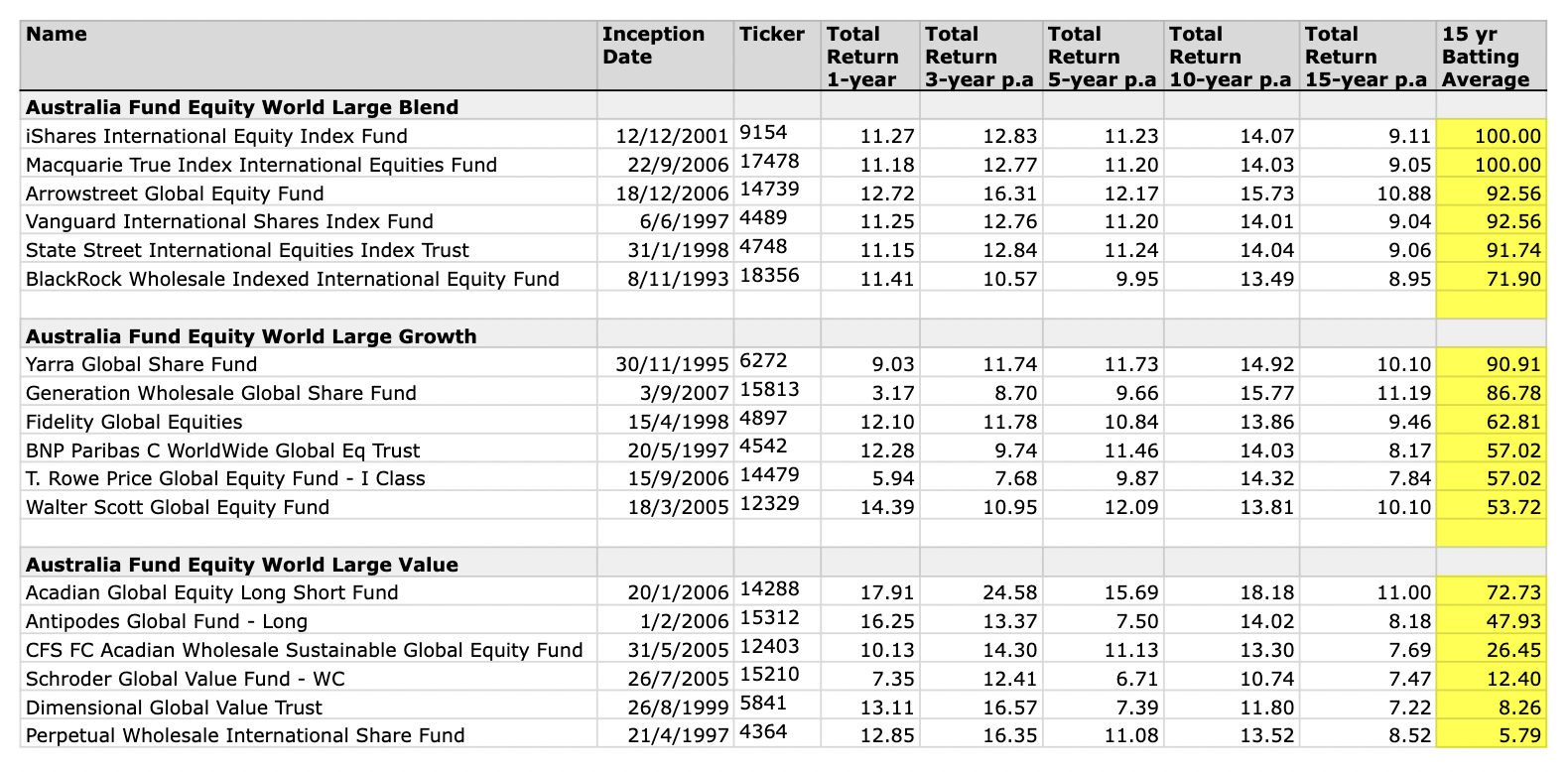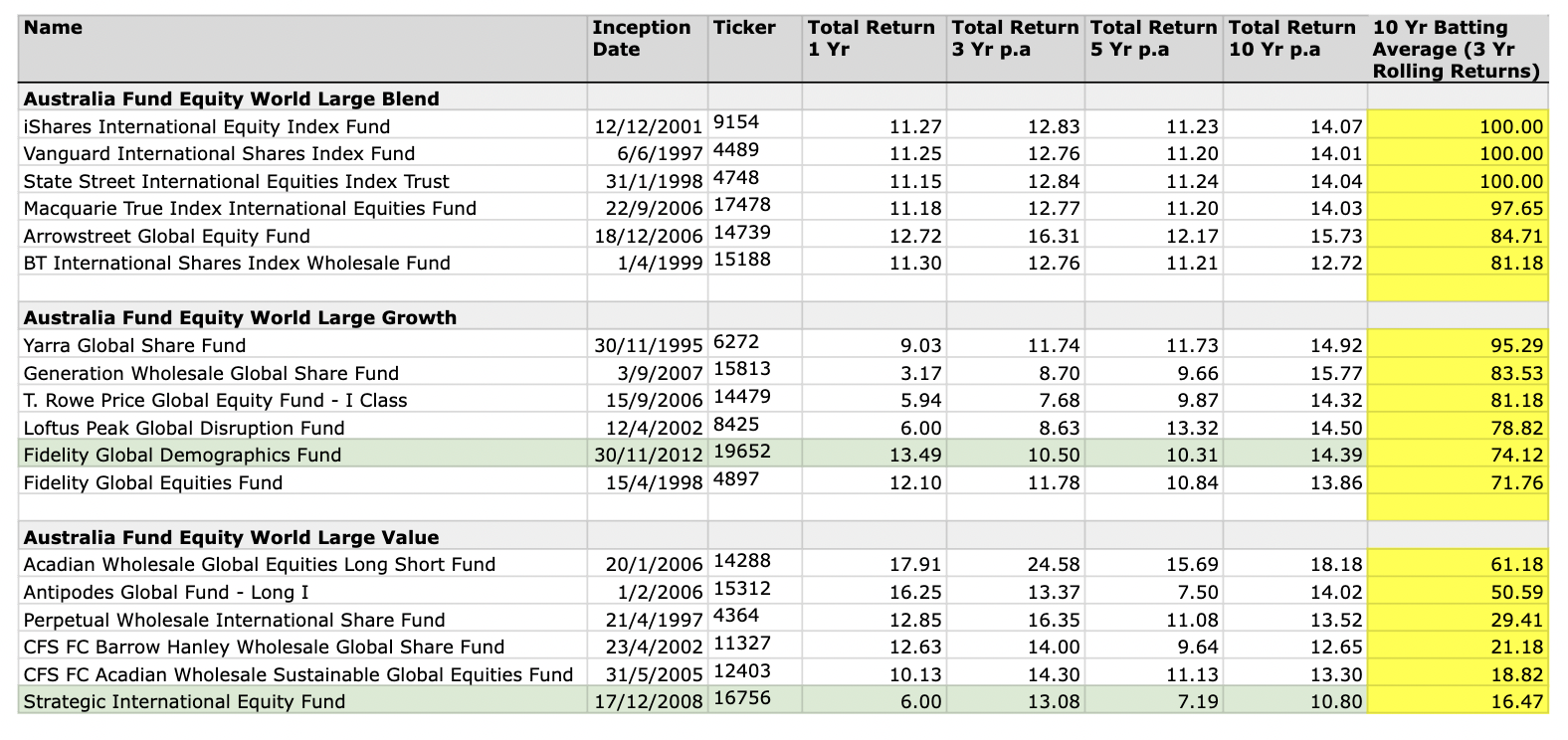Which are the most consistent high-returning global share funds in Australia?
Nearly three decades ago, Australian investors woke up to the opportunities that lay waiting beyond their own doorstep, with local boutiques like Platinum Asset Management bringing the global investment universe down under.
With interest in global companies gathering steam (after all, Australia accounts for only 1.7% of global GDP), the rise in global equities-focused funds followed suit.
In fact, 15 years ago, there were 65 global equities strategies available in Australia. Only five years later, there were 86. Today, there are 228 globally-focused strategies that investors can choose from.
However, unlike their Aussie counterparts, it appears to be far more difficult to deliver consistent alpha when investing offshore. In addition, there's been quite a lot of press in the last few years dedicated to the underperformance of some of the country's most famous offshore-focused funds.
So, which global equities funds can consistently generate alpha throughout the cycle? Glad you asked.
In this wire, you'll learn which funds have been able to consistently outperform their benchmarks over the past 10 and 15 years. And the results, well, are certainly not what you would expect.
.jpg)
Some background for those who missed the last batting average article
In case you missed it, Livewire recently reached out to our friends at Morningstar for a data deep dive into the most consistent outperformers within the Australian funds management landscape.
By dividing the number of rolling periods in which a manager beat or matched an index by the total number of rolling periods within 15 years, we have been able to measure a fund manager's batting average - or, their ability to consistently beat the market.
Given there wasn't a huge number of global funds 15 years ago, we have decided to also analyse the numbers over the past 10 years. The 15-year batting average data is calculated using five-year rolling periods. The 10-year batting average data is calculated using three-year rolling periods.
Why three years? Well, as Michael Malseed, director of manager research at Morningstar explained, three years is the minimum needed to accurately assess a fund manager.
"You wouldn't want to invest in a fund on a 12-month time horizon, that is too short. So a fund shouldn't be measured on that short a time horizon," he says.
"But three to five years is a more appropriate timeframe to measure performance - because that's when their process should have the time to exhibit the potential for outperformance."
To clarify, a manager who meets or outperforms the market in every rolling period during a given time frame would have a batting average of 100. A manager who beats the market in half of these rolling periods would have a batting average of 50.
So, without further ado, here are the most consistent global equities alpha generators. Enjoy!
The most consistent outperformers over 15 years
Note: The only funds with a perfect batting average (100) over a 15-year time period are index-tracking funds.

The most consistent outperformers over the past decade
Note: The funds highlighted in green below are the only funds that have less than 15 years of track record that topped the cohort, so the list doesn't change significantly when comparing a 15-year batting average (five-year rolling returns) and a 10-year batting average (three-year rolling returns).

A quick note
There are some funds on this list that appear to have longer track records than they should. For example, Loftus Peak's Global Disruption Fund launched in 2016 - here, it says 2002.
"Over the past decade, you've had not only rebrandings but shells of funds being used by other funds," Malseed explains.
"Loftus Peak, for example, is using an Equity Trustees trust that has been repurposed, but it's still the same legal trust structure that has existed since 2002. So there are funds that seem to have 15 years of track record but they don't in reality."
He also points to Antipodes Global Fund as another example.
"I would give that one more of a pass as it was formerly Perennial. Graham Hay, who is the portfolio manager of that strategy at Antipodes, was the portfolio manager of that strategy at Perennial, so there is some consistency," Malseed says.
Observations
For the sake of this section of the article, I am going to assume you had the same reaction to this data as me. Ahem, for dramatic effect:
"Wait, what?!? The only funds with batting averages better than Don Bradman's are index-tracking funds. Has there been a mistake?!? Index funds shouldn't be able to consistently outperform a benchmark - in fact, they never should!?!?"
Essentially, the domestic benchmark is going to be a great reflection of what passive funds will return. Passive funds will always slightly underperform it (because of fees). However, the global benchmark isn't a true reflection of the returns an investor is going to receive from a global passive fund. So, why this strange phenomenon?
"The biggest reason is the global index assumes a level of withholding tax for investing offshore," Malseed explains.
"Australia has a raft of tax treaties with other markets, which actually means you get a lower level of withholding tax than the index assumes. So when you get your dividends from offshore what you actually get is higher than what the index assumes."
In addition, like local index funds, global index funds can make a little extra cash by lending stock to long/short funds and hedge funds.
"Both of those factors combined can add up to a little bit more than the fee that they're charging, making the benchmark an easier hurdle," Malseed says.
This doesn't mean that global active funds cannot outperform their respective hurdles. In fact, the top three active "blend" funds outperformed the benchmark (and passive funds) over the past 10 years.
"The benchmark was 13.9% per annum and they all did better than that," Malseed says.
"They just didn’t do it with 100% consistency over the rolling three years, whereas these index funds achieved a much higher batting average because they can outperform by a very small amount consistently because of the withholding tax differences."
How does this impact the ratings process (and what is a "good" batting average)
While a fund manager's batting average is just one element of a lengthy ratings process, Malseed admits the team does prefer fund managers with a batting average (on these long-term measures) of over 80.
"That is a very good reflection of their process working over the cycle," he says.
"There's no hard and fast rule. It's arbitrary. But think about it from an investor’s perspective. An investor would want a fund to outperform its benchmark most of the time they were invested in it, rather than underperforming for a long period of time and having a short period of outperformance."
But that kind of consistency is hard to achieve, he adds.
"Funds management is difficult and in global it's particularly difficult - as we've seen through the active managers that have struggled to beat the benchmark over the past 10 and 15 years," Malseed says.
"It's a pretty small cohort that has outperformed over that time period. And it's an even smaller cohort that has been able to do it with a great deal of consistency."
3 topics

